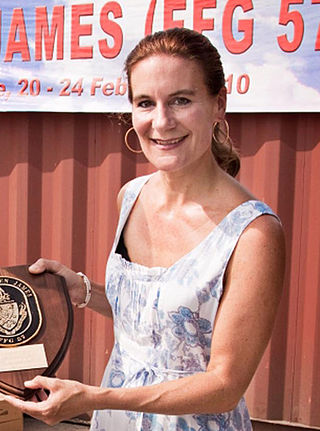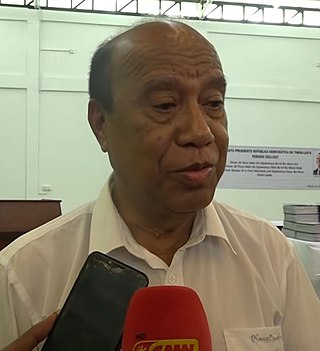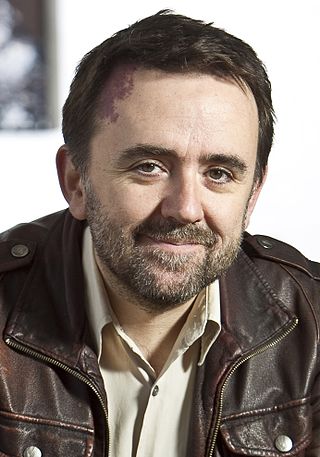
José Manuel Ramos-Horta GCL GColIH is an East Timorese politician. He has been the president of East Timor since 2022, having previously also held the position from 20 May 2007 to 20 May 2012. Previously he was Minister of Foreign Affairs from 2002 to 2006 and Prime Minister from 2006 to 2007. He was a co-recipient of the 1996 Nobel Peace Prize, along with Carlos Filipe Ximenes Belo, for working "towards a just and peaceful solution to the conflict in East Timor".

East Timor, officially the Democratic Republic of Timor-Leste, is a country in Southeast Asia and Oceania. The country comprises the eastern half of the island of Timor and the nearby islands of Atauro and Jaco. The first inhabitants are thought to be descendant of Australoid and Melanesian peoples. The Portuguese began to trade with Timor by the early 16th century and colonised it throughout the mid-century. Skirmishing with the Dutch in the region eventually resulted in an 1859 treaty for which Portugal ceded the western half of the island. Imperial Japan occupied East Timor during World War II, but Portugal resumed colonial authority after the Japanese surrender.

Balibo is a town in East Timor situated approximately 10 kilometres from the Indonesian border. It is located in the sub-district of Balibo, Bobonaro District.

The Balibo Five was a group of journalists for Australian commercial television networks who were murdered in the period leading up to the Indonesian invasion of East Timor. The Balibo Five were based in the town of Balibo in East Timor, where they were killed on 16 October 1975 during Indonesian incursions before the invasion. Roger East travelled to Balibo soon after to investigate the likely deaths of the Five and was later executed by members of the Indonesian military on the docks of Dili.

The Redundancy of Courage is a novel by Timothy Mo published in 1991. It is set in the fictitious country of Danu in Southeast Asia, which is based on East Timor. It is narrated by Adolph Ng, an ethnic Chinese businessman educated in Canada. It was shortlisted for the Booker Prize for Fiction.

Roger East was an Australian journalist who was murdered by the Indonesian military during its invasion of East Timor in 1975.

Kirsty Sword Gusmão, is an Australian-East Timorese activist who served as the First Lady of East Timor from 2002 until 2007. She is married to Xanana Gusmão, former prime minister and president of East Timor, though they separated in 2015. She is the founding director of the Alola Foundation, which seeks to improve the lives of women in Timor-Leste, a nation with one of the world's lowest per capita GDPs.

The Indonesian invasion of East Timor, known in Indonesia as Operation Lotus, began on 7 December 1975 when the Indonesian military (ABRI/TNI) invaded East Timor under the pretext of anti-colonialism and anti-communism to overthrow the Fretilin regime that had emerged in 1974. The overthrow of the popular and short-lived Fretilin-led government sparked a violent quarter-century occupation in which approximately 100,000–180,000 soldiers and civilians are estimated to have been killed or starved to death. The Commission for Reception, Truth and Reconciliation in East Timor documented a minimum estimate of 102,000 conflict-related deaths in East Timor throughout the entire period from 1974 to 1999, including 18,600 violent killings and 84,200 deaths from disease and starvation; Indonesian forces and their auxiliaries combined were responsible for 70% of the killings.

Lieutenant General (Ret.) Muhammad Yunus Yosfiah is an Indonesian politician and a decorated member of the Indonesian Army. Yosfiah served as Minister of Information of Indonesia in the Development Reform Cabinet between 1998 and 1999.

Rogério Tiago De Fatima Lobato is a Timorese politician who was the former minister of defence and minister of interior belonging to Fretilin who is now the current President Of The Special Administrative Region Of Oecusse. He was a founding member of the first independent government of East Timor, in 1975, led by Fretilin. He is also the brother of the late Nicolau Lobato, second President of the country who was killed in action after the Indonesian invasion, in late 1978.

The Indonesian occupation of East Timor began in December 1975 and lasted until October 1999. After centuries of Portuguese colonial rule in East Timor, the 1974 Carnation Revolution in Portugal led to the decolonisation of its former colonies, creating instability in East Timor and leaving its future uncertain. After a small-scale civil war, the pro-independence Fretilin declared victory in the capital city of Dili and declared an independent East Timor on 28 November 1975.

Bilateral relations exist between Australia and East Timor. Both countries are near neighbors with close political and trade ties. East Timor, the youngest and one of the poorest countries in Asia, lies about 610 kilometres northwest of the Australian city of Darwin and Australia has played a prominent role in the young republic's history.

East Timor–Portugal relations are foreign relations between Portugal and East Timor. Timor Leste has an embassy in Lisbon whilst Portugal has an embassy in Dili. East Timor was a colony of Portugal for over 400 years. Both countries belong to the Community of Portuguese Language Countries.

Robert Connolly is an Australian film director, producer, and screenwriter based in Melbourne, Victoria. He is best known as the director and writer of the feature films Balibo, Three Dollars, The Bank and The Dry and its sequel, as well as the producer of Romulus, My Father and The Boys. He is head of the film distribution company, Footprint Films, owned by Arenafilms.

The Tour de Timor is an international mountain bike race held in East Timor. It is a stage race with five stages, with US$75,000 in total prizes.
Frontyard Films is an Australian film production company that makes documentary films, owned by Australian documentary filmmakers Amanda King and Fabio Cavadini. Their films include An Evergreen Island, Starting from Zero and A Thousand Different Angles.

The East Timor genocide refers to the "pacification campaigns" of state terrorism which were waged by the Indonesian New Order government during the Indonesian invasion and occupation of East Timor. The majority of sources consider the Indonesian killings in East Timor to constitute genocide, while other scholars disagree on certain aspects of the definition.

The President B. J. Habibie Bridge is a two-lane road bridge in the suco of Bidau Santana, an inner suburb of Dili, capital city of East Timor. It is named after B. J. Habibie, the President of Indonesia who decided in 1999 to hold that year's referendum on whether East Timor would become independent of Indonesia.
Paul Michael Stewart is an Australian singer-songwriter and trumpeter, journalist and writer. He is the founding mainstay of pub rock band, Painters and Dockers. With fellow members of that group Stewart formed the Dili Allstars in 1992. The Painters and Dockers were inducted into the Age Rock and Roll Hall of Fame in 2010. The group issued four studio albums and staged over 1500 performances across Australia, New Zealand and North America. He issued his autobiography, All the Rage, in 2022.

















